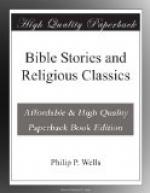On the day of the great festival, Ernest, with all the other people of the valley, left their work, and proceeded to the spot where the sylvan banquet was prepared. As he approached, the loud voice of the Rev. Dr. Battleblast was heard, beseeching a blessing on the good things set before them, and on the distinguished friend of peace in whose honor they were assembled. The tables were arranged in a cleared space of the woods, shut in by the surrounding trees, except where a vista opened eastward, and afforded a distant view of the Great Stone Face. Over the general’s chair, which was a relic from the home of Washington, there was an arch of verdant boughs, with the laurel profusely intermixed, and surmounted by his country’s banner, beneath which he had won his victories. Our friend Ernest raised himself on his tiptoes, in hopes to get a glimpse of the celebrated guest; but there was a mighty crowd about the tables anxious to hear the toasts and speeches, and to catch any word that might fall from the general in reply; and a volunteer company, doing duty as a guard, pricked ruthlessly with their bayonets at any particularly quiet person among the throng. So Ernest, being of an unobtrusive character, was thrust quite into the background, where he could see no more of Old Blood-and-Thunder’s physiognomy than if it had been still blazing on the battle-field. To console himself, he turned toward the Great Stone Face, which, like a faithful and long-remembered friend, looked back and smiled upon him through the vista of the forest. Meantime, however, he could overhear the remarks of various individuals, who were comparing the features of the hero with the face on the distant mountain-side.
“’Tis the same face, to a hair!” cried one man, cutting a caper for joy.
“Wonderfully like, that’s a fact!” responded another.
“Like! why, I call it Old Blood-and-Thunder himself, in a monstrous looking-glass!” cried a third. “And why not? He’s the greatest man of this or any other age, beyond a doubt.”
And then all three of the speakers gave a great shout, which communicated electricity to the crowd, and called forth a roar from a thousand voices, that went reverberating for miles among the mountains, until you might have supposed that the Great Stone Face had poured its thunder-breath into the cry. All these comments, and this vast enthusiasm, served the more to interest our friend; nor did he think of questioning that now, at length, the mountain-visage had found its human counterpart. It is true, Ernest had imagined that this long-looked-for personage would appear in the character of a man of peace, uttering wisdom, and doing good, and making people happy. But, taking an habitual breadth of view, with all his simplicity, he contended that Providence should choose its own method of blessing mankind, and could conceive that this great end might be effected even by a warrior and a bloody sword, should inscrutable wisdom see fit to order matters so.




